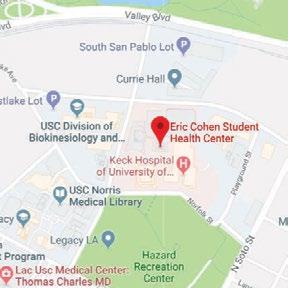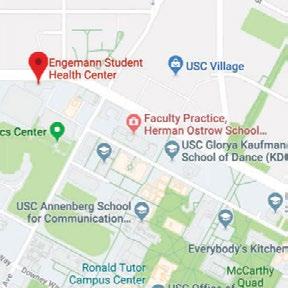A beginner’s guide to HEALTH CARE AND HEALTH INSURANCE FOR USC STUDENTS


A beginner’s guide to HEALTH CARE AND HEALTH INSURANCE FOR USC STUDENTS

Health care through USC Student Health (primary care, counseling, and referrals to specialist care) and health insurance (coverage for paying health care costs) work together to ensure USC students have access to high-quality providers for all their routine needs as well as illness/injury/ crisis counseling care.
This guide walks the first-time user through services on campus (Engemann Student Health Center, UPC; and Eric Cohen Student Health Center, HSC), and extended services that are covered through their insurance plan.
(paid through semesterly fees) provides access to primary care (well visits and sick visits) and counseling services at USC Student Health Centers. Medical appointments and counseling appointments; health education and promotion; immunizations (additional fees may apply) and other travel-related services; on-site appointments with specialists in dermatology, physical therapy, nutrition, allergy, and reproductive/sexual health are also included at no additional cost.
All medical and counseling visits at the campus health centers are included in the fee and there are no additional co-pays. Fees may apply for some lab tests, items such as crutches, and immunizations. Check the current fee list online for specific charges.
USC STUDENT HEALTH on campus services
Payment Coverage
ADDITIONAL CARE
USC Student Insurance Aetna Plan Payment Coverage
PRIMARY CARE: physicals, illness/injury care, reproductive health, allergies, immunizations; counseling and mental health services
Included with student health fee, no copayments.
Fees for lab tests and immunizations may apply
LONG-TERM MEDICAL AND COUNSELING CARE: hospitalizations, emergency room visits, extended medical care by specialists; vision; prescriptions
For in network, USC designated care providers or Aetna preferred care providers, covered 80%-100%.
Use the insurance worksheet to determine coverage, and payment responsibilities including copays, coinisurance and deductibles Comparison Plan(s)
Copays, coinsurance, and deductibles may apply.
(paid through semesterly premiums to Aetna, the current USC student insurance carrier) provides financial coverage for a range of health care services (both preventative and treatment-related for health conditions, as well as emergency room or urgent care services) you may need that is provided outside of USC Student Health services.
Are there any costs other than the insurance premium that is included in the bill for the semester?
Under the Aetna plan, prescription medications, vision care, emergency room care, hospitalizations, long-term mental health counseling (including substance abuse) are all covered at the following negotiated rates: 90% with USC designated care providers and 80% with Aetna preferred care providers. The plan also has an annual deductible and some additional co-insurance. The exact amount paid by the insurance company to the health care provider and the portion that you are expected to pay “out-of-pocket” may vary. See the glossary of terms for additional information, and the Aetna summary sheet for specific costs.
If you have employer-based insurance (through a parent/guardian/spouse/partner) that meets the minimum requirements of the university, or your would like to consider a separate plan, you may opt to waive the Aetna plan (visit bit.ly/uscwaiver online) before the deadline. Make sure you consider the following factors before making your decision.
If your plan originates outside of the region: Make sure that you have coverage in Los Angeles and wherever else you plan to live during the year for routine services. Some plans limit coverage to emergency room care while you are out of the plan area.
Provider network: If the provider network is not extensive in southern California, it may be difficult for you to access key local services (such as mental health) while you are in school.
Your portion of payment responsibility: Some plans may seem attractive by offering a low premium, but require enrollees to pay a large portion of their medical costs through high deductibles, copayments, and coinsurance. If your portion of payment is high, this may discourage you from seeking the care you need, especially in a timely manner.
(part of Keck Medicine of USC) is a comprehensive source for primary care, counseling and mental health services, preventive health services and health promotion for all USC students on its two campuses: University Park (Engemann Student Health Center) and Health Sciences


(Eric Cohen Student Health Center). Accredited by the Association for Ambulatory Health Care, Inc., all health care providers of USC Student Health are fully accredited faculty of the academic medicine departments of Keck Medicine of USC.
Engemann Student Health Center
University Park Campus 1031 West 34th St.
Eric Cohen Student Health Center
Health Sciences Campus 1510 San Pablo St., Suite 104
studenthealth.usc.edu
24/7 phone line: 213-740-9355 (WELL)
Questions?
Email us at studenthealth@usc.edu
USC Student Health negotiates with insurance carriers to ensure the best possible coverage at competitive rates for USC students. Comprehensive coverage and access to high-quality care at affordable cost for students is our goal. If you opt to bring your exisitng insurance plan to campus, or decide to purchase a different plan, we encourage you to be an informed consumer and compare coverage and costs. The worksheet below may help you make your best decision.
USC Aetna plan In comparison
Premium (1 year) $2,702*
Deductible $450 (in network)
Out-of-Pocket Max $6,000
Hospitalizations, 80–90% Surgery, ER (in network)
Extensive Yes, visit Provider aetnastudenthealth.com Network and select “Find a in region? Doctor Hospital or Pharmacy”
Vision coverage? Yes
Prescription Yes coverage?
For further information and questions about student health insurance or billing, contact the Student Insurance Office: USC Student Health Student Health Insurance Office Tel: 213-821-1550
studenthealth@usc.edu
*For students in the graduate online degree programs, the annual premium rate is $5,153.
Primary Care: primary care providers (family medicine, internal medicine, pediatrics) see patients for well visits and sick/injury visits, and make referrals for patients to see specialty care providers (gynecology, dermatology, allergy, nutrition, etc.)
Health Care Provider: a physician, psychologist, counselor, nurse or physician assistant who may be providing care during your visit.
Premium: regular payments to your health insurance company to keep your health care plan active.
Deductible: the total amount you pay “out-of-pocket” to your health care provider for covered services before your health plan kicks in to pay for ongoing treatment.
Copayments: “out of pocket” fees you pay to your health care provider for certain visits.
Coinsurance: is the percentage of covered medical expenses that you pay. Your coinsurance plus the insur ance company’s coinsurance are made to the health care provider.
Provider Network: group of physicians, hospitals, and other health care providers that have agreed to provide medical services at pre-negotiated rates with the insurance company. Note: in general, provider services “in network” (designated care providers or preferred care providers) are covered at the highest percentage (services such as mental health) while you are in school.
Your portion of payment responsibility: Some plans may seem attractive by offering a low premium, but require enrollees to pay a large portion of their medical costs through high deductibles, copayments, and coinsurance. If your portion of payment is high, this may discourage you from seeking the care you need, especially in a timely manner.